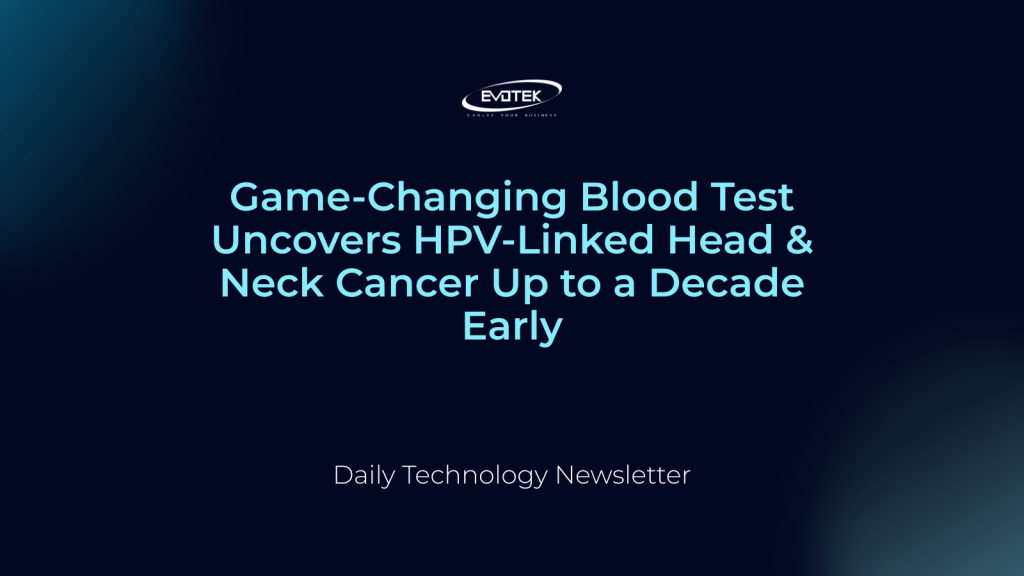A groundbreaking blood test, dubbed HPV-DeepSeek, is demonstrating remarkable potential in identifying human papillomavirus (HPV)-associated head and neck cancers up to a decade before patients experience any symptoms. These pivotal findings suggest a future where these challenging cancers could be diagnosed much earlier, leading to less aggressive treatments and significantly improved patient outcomes.
Developed by researchers at Mass General Brigham, the novel HPV-DeepSeek test leverages a simple blood sample to enable this unprecedented early cancer detection, offering a transformative new avenue for screening HPV-related head and neck cancers.
The Critical Need for Early Detection
Human papillomavirus (HPV) is a primary driver for approximately 70% of all head and neck cancers in the United States, making it the most prevalent cancer type linked to the virus. Alarmingly, the incidence of these cancers continues to climb annually. Unlike HPV-related cervical cancers, which benefit from well-established screening protocols, there has been no effective screening method available for HPV-associated head and neck cancers.
Consequently, most cases are currently diagnosed only after tumors have grown substantially, causing noticeable symptoms and often spreading to nearby lymph nodes. The development of advanced screening tools capable of identifying these cancers at their earliest stages is crucial for patients to begin treatment sooner and achieve better health outcomes.
Detecting Cancer Years Before Symptoms Emerge
In a federally funded study recently published in the Journal of the National Cancer Institute, Mass General Brigham researchers showcased the extraordinary capability of their liquid biopsy test, HPV-DeepSeek. The test successfully detected HPV-related head and neck cancers in asymptomatic individuals as early as 10 years prior to the onset of symptoms.
According to the study’s authors, this ability to diagnose these cancers significantly earlier could dramatically boost treatment success rates and minimize the need for arduous, aggressive therapies.
“Our study demonstrates, for the first time, the accurate detection of HPV-associated cancers in asymptomatic individuals many years before a formal cancer diagnosis,” stated lead study author Daniel L. Faden, MD, FACS, a head and neck surgical oncologist and principal investigator at the Mike Toth Head and Neck Cancer Research Center at Mass Eye and Ear, part of the Mass General Brigham healthcare system.
Dr. Faden added, “Patients often arrive at our clinics with advanced symptoms, necessitating treatments with severe, lifelong side effects. We envision tools like HPV-DeepSeek enabling us to catch these cancers at their nascent stages, ultimately improving patient outcomes and their overall quality of life.”
How HPV-DeepSeek Works
The innovative HPV-DeepSeek blood test utilizes advanced whole-genome sequencing to identify minute fragments of HPV DNA. These DNA fragments shed from tumors and circulate freely in the bloodstream. Previous research from the same team established the test’s impressive diagnostic accuracy, achieving 99% specificity and 99% sensitivity in diagnosing cancer at a patient’s initial clinic visit, outperforming existing diagnostic methods.
To evaluate HPV-DeepSeek’s potential for pre-symptomatic detection, researchers analyzed 56 samples from the Mass General Brigham Biobank. This included 28 samples from individuals who subsequently developed HPV-associated head and neck cancer years later, alongside 28 samples from healthy control subjects.
The HPV-DeepSeek test successfully identified HPV tumor DNA in 22 of the 28 blood samples from patients who later developed cancer. All 28 control samples tested negative, underscoring the test’s high specificity. The test proved more effective at detecting HPV DNA in samples collected closer to the patient’s eventual diagnosis, with the earliest positive result occurring nearly 7.8 years before diagnosis.
Further enhancing its capabilities, researchers employed machine learning algorithms to boost the test’s power, enabling it to accurately identify 27 out of 28 cancer cases, including samples collected up to 10 years prior to diagnosis.
Future Validation and Impact
These promising findings are currently undergoing validation in a second blinded study, funded by the National Institutes of Health (NIH). This crucial next step will involve hundreds of samples collected as part of the Prostate, Lung, Colorectal, and Ovarian Cancer Screening Trial (PLCO) at the National Cancer Institute, paving the way for wider clinical application.
Reference
Dipon Das, Shun Hirayama, Ling Aye, Michael E Bryan, Saskia Naegele, Brian Zhao, Vasileios Efthymiou, Julia Mendel, Adam S Fisch, Zoe Guan, Lea Kröller, Birgitta E Michels, Tim Waterboer, Jeremy D Richmon, Viktor Adalsteinsson, Michael S Lawrence, Matthew G Crowson, A John Iafrate and Daniel L Faden. “Circulating tumor human papillomavirus DNA whole genome sequencing enables human papillomavirus-associated oropharynx cancer early detection.” JNCI: Journal of the National Cancer Institute, 10 September 2025. DOI: 10.1093/jnci/djaf249
Funding and Disclosures
This research was supported by the National Institute of Dental and Craniofacial Research (NIDCR) of the National Institutes of Health (NIH) under grant no. R03DE030550.
Dr. Faden receives salary support from NIH/NIDCR K23 DE029811, NIH/NIDCR R03 DE030550, and NIH/NCI R21 CA267152. He has also received research or in-kind funding from various entities including Bristol-Myers Squibb, Calico, Predicine, BostonGene, Neogenomics, and Haystack (Quest), and consulting fees from Merck, Noetic, Chrysalis Biomedical Advisors, Neogenomics, Arcadia, and Focus. These disclosures are unrelated to the current manuscript’s work. Tim Waterboer serves on advisory boards for Merck (MSD) Sharp & Dohme. All other authors have reported no conflicts of interest.

 日本語
日本語 한국어
한국어 Tiếng Việt
Tiếng Việt 简体中文
简体中文